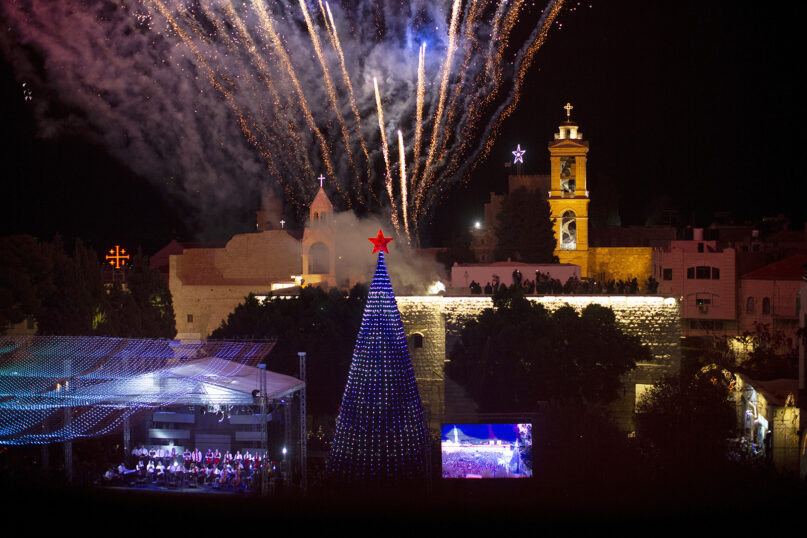(RNS) — There will be no U.S. church choirs singing carols in Bethlehem’s Manger Square to mark Jesus’ birth this year at Christmas.
In late November, Israel imposed a ban on all incoming travel from the U.S. just as the omicron variant of the coronavirus was detected.
Beginning Tuesday (Dec. 21), Israelis may not travel to the U.S., either.
But there was one exception to the November-decreed lockdown: Birthright Israel delegations and similar Jewish travel programs were exempted. As late as Monday, 160 participants in Birthright’s free 10-day trips for young American Jews landed at Ben-Gurion International Airport outside Tel Aviv. No more Birthright travelers will be allowed in for now.
The exception for “Jewish tourism,” which Israeli Interior Minister Ayelet Shaked approved, drew outrage from Christian groups that had planned and paid for pilgrimages to the Holy Land at Christmas.
“I’m glad the Jewish groups are getting in, but be consistent across the board,” said Frank Cox, pastor of North Metro Baptist Church in Lawrenceville, Georgia. “There are other groups that want to experience Israel just as the Jewish people would.”
RELATED: Across US, houses of worship struggle to rebuild attendance
Cox was scheduled to take 40 of his church members to Israel and Jordan to visit the places where Jesus walked and preached. The trip had originally been scheduled two years ago. Last year it was canceled due to the pandemic. This year, all 40 members had meticulously complied with Israel’s strict rules: vaccinations, a booster and three COVID tests (one before the flight and two after arrival).
But in late November, Cox, and hundreds of pastors and church members, were notified their trip was canceled. For some pastors, the notification came at the very last minute. Jordan Easley, pastor of First Baptist Church in Cleveland, Tennessee, had already checked his bags for his visit to Israel along with 100 church members, when a Delta Air Lines representative told him Israel has just closed its borders.
“Our chorus was going to sing Christmas carols as a guest of the mayor of Bethlehem,” said Easley. “It was supposed to be a televised event.”
All foreign citizens were banned from entering Israel beginning Nov. 28. Amid a surge of omicron cases, Israel also classified the United States, Italy, Belgium, Germany, Hungary, Morocco, Portugal, Canada, Switzerland and Turkey as “red” states and placed them under a travel ban on Monday.
As of earlier this week, Israel had 1,306 new COVID-19 cases, the highest daily caseload in two months. Of those about 350 were identified as omicron cases. On Monday, Israel recorded its first omicron-related death.
Many American Jews, especially those with children or close relatives in Israel, also protested the travel ban.
Dov Lipman, founder of Yad L’Olim, an organization that has been fighting for the right of relatives of Israeli immigrants to visit Israel, acknowledged the frustration faced by anyone being denied access to the country.
“Recently, a few groups have been allowed in, but those have been the exception, not the rule,” Lipman said, referring to a handful of Jewish Birthright groups, sports groups and contestants of the Miss Universe pageant, which was held in the seaside resort of Eilat on Dec. 12.
Meanwhile, only first-degree relatives of Israeli immigrants have been allowed entry, and only for life-cycle events such as weddings and births.
The exceptions for the Jewish tour groups at Christmas, one of the top tourist times for Christian pilgrims, were viewed by some as insensitive, if not discriminatory.
“If you’re really trying to stop the spread, it doesn’t matter if you’re Jewish or Christian,” said Brad Brown, a travel agent for Signature Tours in Duluth, Georgia, that books pilgrimage tours for church groups. “It looks bad when American Christians, and I’m assuming Muslims, can’t get in.”
The Jewish tourism exception approved by Shaked, a conservative firebrand who supports the annexation of the West Bank and expansion of settlements there and opposes an independent Palestinian state, was criticized inside Israel, too.
Shaked’s Ministry of the Interior did not respond to a request for an interview.
The travel ban has hit the Palestinian economy hard, especially in tourist destinations such as Bethlehem.
“A very large percentage of Bethlehem-area residents rely on tourism for their livelihoods,” said Khadar Abu Jeries, manager of the Peace Café, on Manger Square in Bethlehem.
Khalil Awad, the owner of the Old Cave Souvenir shop in Bethlehem, is one of them. His 40-year-old shop, which reopened in November after closing in 2020, supports four families, he said.
“We had hoped and prayed people would come for Christmas,” Awad said. “Now our hopes are dashed.”
The closure, of course, affected the wallets of the U.S. tourists, too. Brown said he was able to refund most of the money church groups had put up for the trip. But some pastors said many church families were suddenly faced with planning a holiday stateside when they thought they’d be abroad.
Brown said only about half as many people have signed on for a rescheduled trip next year.
“These are trips of a lifetime for people,” he said. “They want to go to Jerusalem before they die. Some of these people never travel internationally at all. They may never have been outside Oklahoma, but they’ll go to Israel.”
Yonat Shimron reported from the U.S.; Michele Chabin from Israel.
RELATED: Americans support a high bar for religious exemptions to vaccines





